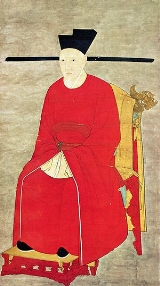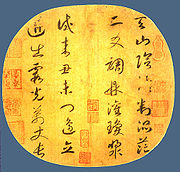
Emperor Gaozong of Song
Encyclopedia
Emperor Gaozong (12 June 1107 – 9 November 1187), born Zhao Gou, was the tenth emperor of the Song Dynasty of China
, and the first emperor of the Southern Song. He reigned from 1127 to 1162. He fled south after the Jurchens
overran Kaifeng
in the Jingkang Incident
, hence the beginning of the Southern Song dynasty 1127–1279. Gaozong re-established his seat of government in Lin'an
(臨安; today's Hangzhou
, 杭州).
, and is known posthumously as Empress Xianren (顯仁皇后) (1080–1159).
 Gaozong was a regional ruler in the Northern Song dynasty. After Song's Qinzong and Huizong emperors were captured by the Jurchen, he became the emperor of China and established Southern Song empire. During his reign, Jurchens
Gaozong was a regional ruler in the Northern Song dynasty. After Song's Qinzong and Huizong emperors were captured by the Jurchen, he became the emperor of China and established Southern Song empire. During his reign, Jurchens
often attacked the Southern Song empire. Initially, he used military officials such as Li Gang
, Zong Ze, Yue Fei
, Han Shizhong
and Yu Yunwen to hold the Jurchens at bay. However, after years of fighting and significant military success, Gaozong settled on a pacifist stance. One of the major reasons behind this was that Gaozong and the premier Qin Hui
did not want the Song army to defeat the Jurchens, as this might result in Emperor Qinzong being restored to the throne. As a result, Gaozong and Qin plotted to frame Yue Fei
for some ambiguous offence and had him put to death. General Han Shizhong
was also dismissed from his military duties. Gaozong then signed the Treaty of Shaoxing
with the Jurchens
which further ceded huge amounts of territories to the Jurchens in the hope of appeasement.
Gaozong was also a notable poet, and had significant influence on other Chinese poets. Among his surviving works is "Quatrain on Heavenly Mountain" (left).
Gaozong abdicated in 1162 after reigning for more than 35 years but lived on until 1187. He was 80 when he died. His temple name
means "High Ancestor".
China
Chinese civilization may refer to:* China for more general discussion of the country.* Chinese culture* Greater China, the transnational community of ethnic Chinese.* History of China* Sinosphere, the area historically affected by Chinese culture...
, and the first emperor of the Southern Song. He reigned from 1127 to 1162. He fled south after the Jurchens
Jurchens
The Jurchens were a Tungusic people who inhabited the region of Manchuria until the 17th century, when they adopted the name Manchu...
overran Kaifeng
Kaifeng
Kaifeng , known previously by several names , is a prefecture-level city in east-central Henan province, Central China. Nearly 5 million people live in the metropolitan area...
in the Jingkang Incident
Jingkang Incident
The Jingkang Incident , the Humiliation of Jingkang , or The Disorders of the Jingkang Period took place in 1127 when invading Jurchen soldiers from the Jin Dynasty besieged and sacked Bianjing , the capital of the Song Dynasty of China...
, hence the beginning of the Southern Song dynasty 1127–1279. Gaozong re-established his seat of government in Lin'an
Lin'an
Lin'an may refer to:*Hangzhou, formerly named Lin'an in Song Dynasty, city in Zhejiang, China*Lin'an City, county-level city in Hangzhou, Zhejiang, China...
(臨安; today's Hangzhou
Hangzhou
Hangzhou , formerly transliterated as Hangchow, is the capital and largest city of Zhejiang Province in Eastern China. Governed as a sub-provincial city, and as of 2010, its entire administrative division or prefecture had a registered population of 8.7 million people...
, 杭州).
Biography
Gaozong was the 5th son of Emperor Huizong and the younger half-brother of Emperor Qinzong. His mother was a concubine from the Wei (韋) family who later became empress dowagerEmpress Dowager
Empress Dowager was the title given to the mother of a Chinese, Korean, Japanese or Vietnamese emperor.The title was also given occasionally to another woman of the same generation, while a woman from the previous generation was sometimes given the title of Grand empress dowager. Numerous empress...
, and is known posthumously as Empress Xianren (顯仁皇后) (1080–1159).

Jurchens
The Jurchens were a Tungusic people who inhabited the region of Manchuria until the 17th century, when they adopted the name Manchu...
often attacked the Southern Song empire. Initially, he used military officials such as Li Gang
Li Gang
Li Gang is a Chinese football player who currently plays for Chengdu Blades as a midfielder in the Chinese Super League where he is also their current captain.-Shanghai:...
, Zong Ze, Yue Fei
Yue Fei
Yue Fei , style name Pengju, was a military general of the Southern Song Dynasty. His ancestral home was in Xiaoti, Yonghe Village, Tangyin, Xiangzhou, Henan...
, Han Shizhong
Han Shizhong
Han Shizhong was a Chinese general of the late Northern Song Dynasty and the early Southern Song Dynasty. He dedicated his whole life to serving the Song Dynasty, and performed many legendary deeds. It is said that he had scars all over his body and, by the time he retired, there were only four...
and Yu Yunwen to hold the Jurchens at bay. However, after years of fighting and significant military success, Gaozong settled on a pacifist stance. One of the major reasons behind this was that Gaozong and the premier Qin Hui
Qin Hui (Song Dynasty)
Qin Hui or Qin Kuai was a Chancellor of the Song Dynasty in China, who is widely regarded as a traitor of the Han race for his part in the political execution of General Yue Fei...
did not want the Song army to defeat the Jurchens, as this might result in Emperor Qinzong being restored to the throne. As a result, Gaozong and Qin plotted to frame Yue Fei
Yue Fei
Yue Fei , style name Pengju, was a military general of the Southern Song Dynasty. His ancestral home was in Xiaoti, Yonghe Village, Tangyin, Xiangzhou, Henan...
for some ambiguous offence and had him put to death. General Han Shizhong
Han Shizhong
Han Shizhong was a Chinese general of the late Northern Song Dynasty and the early Southern Song Dynasty. He dedicated his whole life to serving the Song Dynasty, and performed many legendary deeds. It is said that he had scars all over his body and, by the time he retired, there were only four...
was also dismissed from his military duties. Gaozong then signed the Treaty of Shaoxing
Treaty of Shaoxing
The Treaty of Shaoxing is the agreement which ended the conflicts between the Jin Dynasty and Southern Song Dynasty. It also legally drew up the boundaries of the two countries and forcing the Song Dynasty to renounce all claims to its former territories north of the Huai river...
with the Jurchens
Jurchens
The Jurchens were a Tungusic people who inhabited the region of Manchuria until the 17th century, when they adopted the name Manchu...
which further ceded huge amounts of territories to the Jurchens in the hope of appeasement.
Gaozong was also a notable poet, and had significant influence on other Chinese poets. Among his surviving works is "Quatrain on Heavenly Mountain" (left).
Gaozong abdicated in 1162 after reigning for more than 35 years but lived on until 1187. He was 80 when he died. His temple name
Temple name
Temple names are commonly used when naming most Chinese, Korean , and Vietnamese royalty. They should not be confused with era names. Compared to posthumous names, the use of temple names is more exclusive...
means "High Ancestor".
Titles from birth
- His Imperial Highness The Prince of Kang 康王
- His Imperial Majesty The Emperor
- His Imperial Majesty The Retired Emperor 太上皇
Wives
- Empress WuEmpress Wu (Gaozong of Song)Empress Wu was a Chinese Empress consort of the Song Dynasty, married to Emperor Gaozong of Song.- Sources :...
(1115-1197), was first given the title Lady of the Heyui Commandery (和義郡夫人), eventually became empress after the announcement of the death of Empress Ying
See also
- Yue FeiYue FeiYue Fei , style name Pengju, was a military general of the Southern Song Dynasty. His ancestral home was in Xiaoti, Yonghe Village, Tangyin, Xiangzhou, Henan...
- List of Song Emperors
- Architecture of the Song DynastyArchitecture of the Song DynastyThe architecture of the Song Dynasty was noted for its towering Buddhist pagodas, enormous stone and wooden bridges, lavish tombs, and palaces. Although literary works on architecture existed beforehand, architectural writing blossomed during the Song Dynasty, maturing into a more professional...
- Culture of the Song DynastyCulture of the Song DynastyThe Song Dynasty was a culturally rich and sophisticated age for China. There was blossoming of and advancements in the visual arts, music, literature, and philosophy...
- Economy of the Song DynastyEconomy of the Song DynastyThe economy of China under the Song Dynasty of China was marked by commercial expansion, financial prosperity, increased international trade-contacts, and a revolution in agricultural productivity. Private finance grew, stimulating the development of a country-wide market network which linked the...
- History of the Song DynastyHistory of the Song DynastyThe Song Dynasty of China was a ruling dynasty that controlled China proper and southern China from the middle of the 10th century into the last quarter of the 13th century...
- Society of the Song DynastySociety of the Song DynastyChinese society during the Song Dynasty was marked by political and legal reforms, a philosophical revival of Confucianism, and the development of cities beyond administrative purposes into centers of trade, industry, and maritime commerce...
- Technology of the Song DynastyTechnology of the Song DynastyThe Song Dynasty provided some of the most significant technological advances in Chinese history, many of which came from talented statesmen drafted by the government through imperial examinations....

